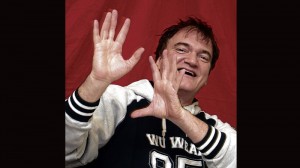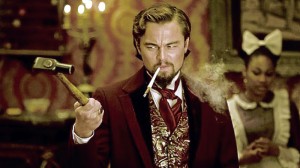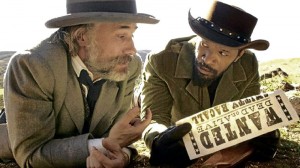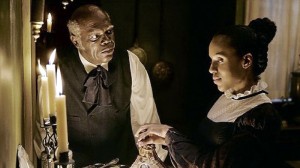How Tarantino lost and found the acting bug
LOS ANGELES – “Cinemanila!” Quentin Tarantino exclaimed in our recent encounter. “That was fun!” He was, of course, referring to the film festival in the Philippines that honored him in 2007.
Wearing a hooded jacket, his hair unruly as usual, Quentin talked in the energetic style he’s known for. His enthusiastic manner of answering questions is matched by his infectious, no-holding-back laughter.
Quentin recently won the Golden Globe best screenplay for “Django Unchained,” which he also directed. While it’s classified as a drama in a spaghetti western vein, “Django…” mixes in humor that made us really laugh.
Tackling the subject of slavery in the South two years before the American Civil War, “Django…” stars Jamie Foxx in the title role, Christoph Waltz, Leonardo DiCaprio, Kerry Washington and Samuel L. Jackson.
In this interview, Quentin perfectly described Christoph—who won the Golden Globe best supporting actor for his portrayal of a smooth-talking bounty hunter—as an actor who “truly sings my dialogue. He makes it poetry.”
Article continues after this advertisementWe know you have an impressive collection of films, even Filipino B movies and Filipino versions of spaghetti westerns, at home. Which of the spaghetti westerns do you like most?
“The Good, the Bad and the Ugly” is my favorite movie of all time. The whole “Dollars Trilogy” (“A Fistful of Dollars,” “For a Few Dollars More” and “The Good, the Bad and the Ugly”) is my favorite. Actually, “Once Upon a Time in the West” could have been the fourth film, had Clint Eastwood played the role when it was offered to him.
I’m a huge fan of Sergio Corbucci films, particularly “Navajo Joe”—it’s one of my favorites with Burt Reynolds. And also “The Hellbenders,” another Corbucci movie with Joseph Cotten. I’m also a big fan of another film that’s really iconic, “Day of Anger” with Lee Van Cleef.
Can you describe your bedroom? I imagine it has 10 remote controls and hundreds of DVDs under the bed.
It’s funny, my room doesn’t have a lot of my accoutrements. My house is full of accoutrements. But the bedroom is kept clear of a lot of that. It’s the most uncluttered place, even though it’s still kind of cluttered. It’s a good pacing place. It’s got a nice bed. But off this room is my record room.
Basically, the house I have has a big master bedroom. There was a nursery attached to it. I turned the nursery into a record room. It looks like a used record store where records are filed in bins, into categories. That’s where I play my music and when I’m thinking about the movie, working things out in my head. I’ll go and play my soundtracks, the different music I’m thinking about doing for the movie.
I do a lot of my writing on the balcony that’s right outside my bedroom.
The film is campy, serious and comedic. How did you balance it all and in the spaghetti western genre?
I thought that putting America’s slavery and racist past in the framework of a subgenre of the spaghetti western was a good way to tell the story. It’s an exciting story that people might want to see. You could also explore the whole backdrop of the slavery aspect. But also, the whole idea of a spaghetti western, the way it deals with the issues, is operatic. These are operatic emotions that we’re dealing with. These are larger-than-life moments that we’re dealing with in this film, as well as surreal moments, which is part of the thing of spaghetti westerns, and the gallows humor involved.
As far as how I balance them, that’s just how what I do—balancing these different emotions. If I pull it off, it’s like, I want you to feel this, change, now feel this … that’s how it’s supposed to work.
How are you as an actor in your own eyes?
I don’t know. Long time ago, I was really into acting. I’ve completely lost the bug. Part of the reason that I cast myself in that role is because we kept moving. That was a scene that we could do at any point in time. So any time we went over somewhere, we pushed it back. It was a scene you could always move back and do at a different time.
So, rather than keep the actors on the hook all the time, I decided, well, let me play the role. I’ll do an okay job with it. It’s also toward the end of the movie, so if I have to cut myself, I don’t mind cutting myself down. I don’t want to have some actor who’s really cool to wait around for seven months and then I cut his role down to nothing. I can do that to myself.
How has your friendship with Christoph Waltz evolved since “Inglourious Basterds”? And what kind of discussions did you have with him about the role?
It has definitely evolved into a lovely, tender, glorious friendship that I cherish very much. He is a truly magnificent artist. I’m very lucky to have him play my characters. He truly sings my dialogue. He makes it poetry. When I wrote “Inglourious Basterds,” I didn’t know him. I was just taking this huge leap of faith. It was one of the biggest leaps of faith I ever took.
Then I met him and I was paid off. But this time around, I knew I was writing for him so when he would come and visit Los Angeles, he would come to my house. I’d give him however much of the script I had written at the time. Maybe it was like 25 pages the first time he came over. They were typed up and ready for him. He read those 25 pages in one sitting.
I paced around and watched him read it. Then we talked about it for a little bit. We went out, had dinner and talked about it a little bit more. Then he went off to do whatever he did. He’d come back again and there would be like 20 more pages written. He’d sit there and read it. Except for Uma Thurman on “Kill Bill,” I’ve never shared the process that much with another actor. I just did it with him because it was fun.
What have you learned from Christoph?
He’s a man of high culture, who promotes high culture. I like to promote low culture. But I have an appreciation for high culture. And he has appreciation for low culture. So we actually feed each other in nice ways. We have these really interesting, profound discussions which you wouldn’t think we would be having serious discussions about. He takes me to operas and ballets. It’s really nice.
While your movies are violent, they’re also about the pursuit of undying love. How good are you at pursuing someone you love?
I’ve gone on the pursuit before. (Laughs.) I was dogged for a while. I’ve had situations where I was gobsmacked by a girl. I went out to try and get her, and I got her.
(E-mail the columnist at [email protected]. Follow him at https://twitter.com/nepalesruben.)



